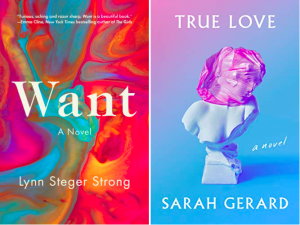
Our fivesome of feted reviews this week includes Lorrie Moore on Millennials Vs. Boomers and Sally Rooney’s Normal People, Etelka Lehoczky on Papercutz’ new Asterix reissues, Geoff Dyer on Larry McMurtrey’s Lonesome Dove, Vinson Cunningham on Frank B. Wilderson III’s Afropessimism, and Kristen Martin on Lynn Steger Strong’s Want and Sarah Gerard’s True Love.
*
“In a year that featured a surprising number of literary novels with a focus on high school—Susan Choi’s Trust Exercise, Ann Beattie’s A Wonderful Stroke of Luck, Ben Lerner’s The Topeka School, Colson Whitehead’s The Nickel Boys—Rooney’s was the one that became an international sensation. Perhaps, in part, this is because it posits a romance for romantic agnostics, and thus speaks to many generations at once, though especially her own … Rooney’s book is written in a direct, barebones style reminiscent of a script—third-person narration, mostly present tense, quick dialogue, perfunctory stage directions, explicit time-markers, a past tense to explain why and where we are in the present. Now that it is a twelve-part, binge-able series imported from the BBC as a Hulu Original and directed by Lenny Abrahamson in the first half and Hettie Macdonald in the second, a viewer can follow along with the book and see how faithful the show is. Rooney herself helped in adapting it, writing most of the script, and the series’s adherence to the novel’s scenes and dialogue is surely a writer’s dream. But it may also be a writer’s nightmare, since the show deepens and vivifies the novel—largely due to two sensitive performances at the helm and beautiful camera work. The series portrays states of mind much better than the novel does. Rooney is not likely to hear from viewers that ‘your book was better,’ at least not very often or accurately, but she also may not care a whit … The storyline, then, is full of emotional boom and bust, having little more eventfulness than the Dan Hicks song ‘How Can I Miss You If You Won’t Go Away.’ Rooney throws small, surmountable obstacles in the lovers’ path, but they are too young to realize that a little gravel is not a wall. When one of them goes back to Carricklea, the other remains in Dublin. And vice versa. They are constantly leaving each other so the narrative can have them meet up again. Their love is both a sacred space—it can’t be successfully integrated into the rest of the world—and a disposable arrangement. Because of the flimsiest misunderstandings, they back away from each other to embark on something quite inferior, only to return to each other later. Aside from some statements that personal growth has occurred (we’ll take their word for it), that is pretty much it for plot, over a five-year period. There are some tears. Some cutting. Some drunkenness…But it is heaven to watch … The zig and zag of rupture and reconciliation makes Normal People mostly a picaresque and inconclusive romance, but also a millennial photo album.”
–Lorrie Moore on Millennials Vs. Boomers and Sally Rooney’s Normal People (The New York Review of Books)

“Asterix the Gaul, which kicks off the first volume of Papercutz’ new Asterix reissues, doesn’t feel like the genesis of an international juggernaut. Sure, the 1959 cartoon is funny: Diminutive-but-crafty Asterix and his towering sidekick Obelix are Laurel and Hardy transplanted to 50 B.C., delivering gonzo comeuppance to the Roman soldiers who hope to bring all of France under Caesar’s rule. But nothing about René Goscinny’s goofy narrative or Albert Uderzo’s hyperactive, deliberately lowbrow drawings portend what the Asterix series became: a half-century-spanning, globally-bestselling, nation-defining phenomenon … though Asterix has become a symbol of French authenticity, the series is actually just as much a hybrid as its authors were. That’s the real reason for its continuing appeal across decades and national boundaries: It’s a masterpiece of cross-cultural borrowing and reinvention … While grown-up American fans may want to stick with their Bell-Hockridge editions, it’s fascinating to watch [Joe] Johnson engage anew with Goscinny’s layered, punning humor. Many of Goscinny and Uderzo’s jokes about the different accents and customs of Gauls, Goths and Romans are impossible to understand in English, but Johnson does a good job of indicating what’s so funny about Uderzo’s caricatures …Unfortunately, things get a bit too modern in a brand-new volume, The Chieftain’s Daughter, which is full of lame attempts to appeal to 21st-century teens. But that’s not Johnson’s fault; blame the French hired-gun writers, brought in to keep a valuable franchise alive. (For the series at its best, stick to the books written by Goscinny himself before his death in 1977.) And there’s nothing Johnson can do about the noxious stereotypes Uderzo employs in his depictions of Africans and other nonwhite races. It’s ironic that a work so mischievously subversive and anti-imperialist should reinscribe stereotypes that are as hackneyed as they are offensive. For some parents that may be a reason to give the whole series a pass. But if you’d like to talk to your kids about where comic tropes come from, what they mean and what effects they have, Asterix is well worth talking about.”
–Etelka Lehoczky on Papercutz’ new Asterix reissues (NPR)
“Earlier this year I had one of the most remarkable reading experiences of my life—so intense that it’s taken a while to recover from it or at least to process what happened … despite Lonesome Dove having received the imprimatur of a Pulitzer Prize, it is also regarded as an extended piece of superior entertainment. Regarded by whom? By that sector of the reading population which plays a far greater role in the perception of an author’s work than is sometimes acknowledged: those who haven’t read it…Lest this sound condescending, I was, for a long time, one of these others. In 1990 I’d read Cormac McCarthy’s Blood Meridian and had then reviewed All the Pretty Horses and its follow-ups in a state of sustained critical rapture. In the midst of this phase of intoxication a friend asked, in the politely curious tones of concerned intervention, if I happened to have read Lonesome Dove. I hadn’t and had no intention of doing so, because I knew—on the basis of zero knowledge of anything except the cover of the British paperback—that it was not of the same literary quality as anything in McCarthy’s Border trilogy … everyone’s on the move, with lots of people hunting for each other, but there’s no need to get hung up on details of a plot in which the permutations of searches and searchers will change multiple times in the course of the ride. All that matters is that, across vast and slow distances, there is the possibility, however geographically remote, of destinies converging … What follows in those pages is an epic, an odyssey of plain and prairie. McMurtry has said that he ‘thought of Lonesome Dove as demythicizing, but instead it became a kind of American Arthuriad, overflowing the bounds of genre in many curious ways.’ The myth, in other words, is so entrenched in the real that Brands’s descriptions of the historic cattle drives of the 1860s and 70s initiated by Charles Goodnight, Oliver Loving and Joseph McCoy read like summaries of scenes from the novel by McMurtry—who, in the 1980s, had used the cattle men’s original memoirs and recollections to earth his fiction … I fell prey to a kind of fanaticism myself, emailing an unsuspecting Zadie Smith to ask why anyone would bother with even a page of Saul Bellow when they could be immersed in Lonesome Dove. When she wrote back that she couldn’t bear Bellow or westerns I was tempted to respond, insanely, that it wasn’t a western. And yet—to deploy a favorite hesitation of Steiner’s—perhaps an underlying sanity or logic was at work.”
–Geoff Dyer on Larry McMurtrey’s Lonesome Dove (TLS)
“It’s possible to regard Wilderson’s manner of spinning toward and away from the particulars of a story without ever fully telling the thing as a critique of the Black autobiographical tradition—which, in America, begins with the slave narratives of Harriet Jacobs and Frederick Douglass and includes Richard Wright’s Black Boy and the autobiographies of Malcolm X, Angela Davis, and Assata Shakur. Common to the genre, even in its most radical iterations, is a narrative thrust that accentuates the forward movement of the writer…Even if progress isn’t the message, it insinuates itself into the rhythm of this kind of book and becomes a quiet component of its logic. Wilderson obliterates that logic. What happened to him yesterday is what will happen to him today, only more loudly. Nothing has really changed: Black people still occupy the position of slaves, and what matters in the story of Frank and Stella is the nature of the forces arrayed against them, not how and whether they get away. (No one gets away) … He writes from history’s humid basement, or from its even less accessible underground bunker, and the plants that bloom in his writing are less floral than fungal—his arguments and remembrances grow in tight groups, close to the ground and propped atop rotting anecdotal logs, all of them adding to the shroomy funk of the room … Every society has a murderous hierarchy: someone’s always knocking at the basement door, trying to get free. But life is prismatic—it’s possible to be Black and degraded in America while also profiting from wanton extraction of resources overseas, oppressing millions of non-Black others, and living on land stolen from indigenous people. We are always joined in our sufferings, often by somebody we can’t see through the darkness. We speak of solidarity precisely because the empathetic act of analogy is a way of acknowledging this complexity, and of training our ethical senses, again and again, to widen the circle of our concern. Any system of thought that has refined itself beyond the ability to imagine kinship with the stranded Guatemalan kid detained at the U.S. border, or with the functionally enslaved Uyghur in China, or, again…with the Native American on whose stolen ancestral ground you live and do your business, is lost in its own fog.”
–Vinson Cunningham on Frank B. Wilderson III’s Afropessimism (The New Yorker)

“Want, then, presents a recognizable vision of a certain kind of life under contemporary capitalism—one of downwardly mobile female exhaustion and thwarted dreams, yes—that still acknowledges the power of desire, and the danger of even the smallest desire for something better than the system has relegated to you. Published on the same day as Want, Sarah Gerard’s True Love takes the consequences of wanting too much down a path that is at once funnier and more dire. Gerard’s protagonist Nina reads almost like a younger version of Elizabeth, if she had dropped out of college and wound up back in Florida instead of clawing her way out of her clinical depression and through the milestones that we’re told constitute fulfillment … It matters that in both of these books, women are unable to reach their potential, professionally and personally, because of the crushing grind of making rent in New York and the foreclosure of a livable wage for writers and academics. But while both Want and True Love espouse a generally leftist set of morals and politics, there is no solution to be found in the collective here. Elizabeth and Nina are on their own … It is heartening to see both characters want for more than what the world has to offer them, instead of reacting to their circumstances with yet more ennui and anomie. But in Want and True Love, it is the women—and not the systems they operate in—that are ultimately painted to be the cause of their own problems. The game might be rigged, but they aren’t good at playing … Both Want and True Love enact what it feels like to be worn down, not just by the world and its economics but by the way we choose to move through it. That is a worthy function of both novels: to invite us into feeling each woman’s precariousness, to understand both its systemic and personal roots. If we are still waiting on a book about women living in this era where fixing, getting better, is more than just a fantasy, perhaps we are still waiting for a world where it’s possible to fix.”
–Kristen Martin on Lynn Steger Strong’s Want and Sarah Gerard’s True Love (The Baffler)

